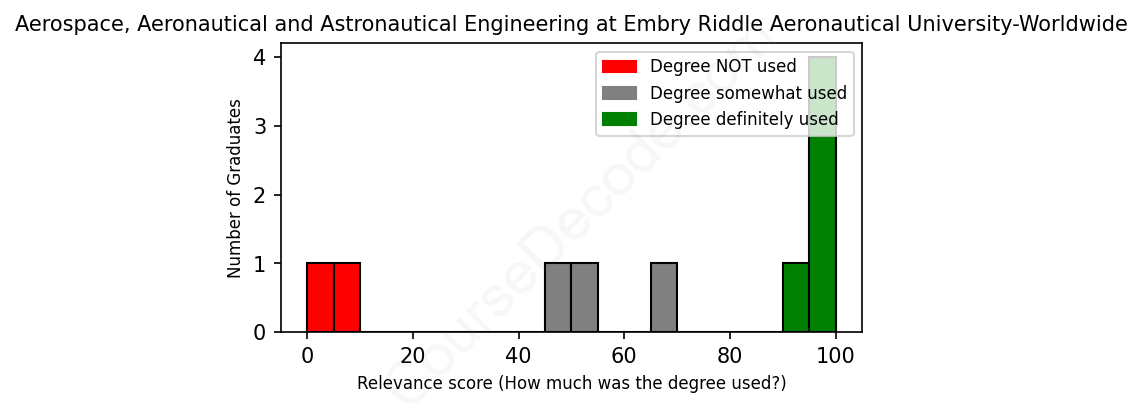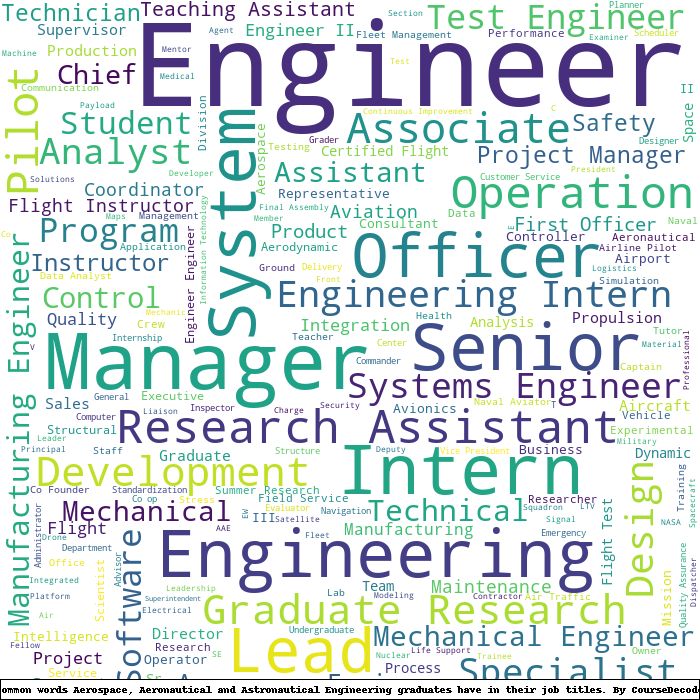
First, some facts. Of the Aerospace, Aeronautical and Astronautical Engineering graduates from Embry Riddle Aeronautical University-Worldwide we've analyzed , here's how many have used (or NOT used) their degree in their career:

These are estimates based on AI analysis of 10 LinkedIn profiles (see below).
The verdict? Slightly below average. Overall, with an average relevance score of 66%, Aerospace, Aeronautical and Astronautical Engineering graduates from Embry Riddle Aeronautical University-Worldwide have a slightly lower likelihood (-1%) of finding work in this field compared to the average graduate across all fields:
And for comparison, here's the chart for all profiles we've looked at across all degrees.
Also, after graduating, only 20% of these graduates have pursued further education other than another Bachelor's degree (such as a Masters degree or other), compared to the average across all profiles of 35%. This suggests a Bachelors degree is enough for most Aerospace, Aeronautical and Astronautical Engineering graduates, and it's normal to look for work straight after graduation.
See the details:
|
Relevance score: 45% We think this person has gone into a career only somewhat relevant to their degree. We think this person has gone into a career only somewhat relevant to their degree.
DEGREE INFOGraduated in 2014 from Embry Riddle Aeronautical University-Worldwide with a Bachelor of Science (B.S.) in Aerospace, Aeronautical and Astronautical Engineering. No other secondary education since. JOB HISTORY SINCE GRADUATIONMetals Technology Instructor PKL Services Apr 2014 - Sep 2015 Lead Instructor  PKL Services Sep 2015 - Oct 2023 Instructor  Valencia College Accelerated Skills Training (AST) Oct 2023 - Present ABOUTNo information provided. |
The top 10 most common jobs done by the graduates we've analyzed (ranked most common to least) are:
After looking through the LinkedIn profiles of Embry Riddle Aeronautical University-Worldwide graduates, it seems like the most common jobs people are landing are pretty diverse. Lots of graduates have ended up in roles like Subcontract Managers and various positions at places like Lockheed Martin and Collins Aerospace. These jobs often do require some level of aerospace engineering knowledge, especially in the technical aspects or project management related to aerospace projects. However, a significant number of alumni have taken on positions that don’t majorly utilize their engineering training at all, such as Executive Assistants, Customer Trainers, and even roles completely outside the field like real estate. It’s a mixed bag, honestly.
Looking deeper into their career paths, many people found their degrees helpful in obtaining roles related to aviation, flight operations, and maintenance that apply their technical skills directly. The military also seems to have drawn in a bunch of graduates, with strong roles like Avionics Officers and Maintenance Test Pilots making the most of their aerospace backgrounds. But then there’s the other side with more administrative or unrelated jobs where the degree doesn’t play much of a role. So, while some alumni are definitely working in fields related to their education, there are plenty of them who have veered off into other territories where their aerospace degree isn't used much, if at all.
Here is a visual representation of the most common words in job titles for Aerospace, Aeronautical and Astronautical Engineering graduates (this is across all Aerospace, Aeronautical and Astronautical Engineering graduates we've analyzed, not just those who went to Embry Riddle Aeronautical University-Worldwide):

Graduates from Embry Riddle Aeronautical University-Worldwide generally tend to have solid career trajectories in fields related to Aerospace, Aeronautical and Astronautical Engineering, particularly in their early career stages. For instance, many of them land roles straight out of college that are directly relevant to their degrees, like product support, avionics positions, and flight coordination. It's common to see them starting with positions that may not be high-level but are crucial stepping stones, such as Executive Assistant or Flight Coordinator. Over the first few years, many progress within technical or managerial roles at reputable companies, including big names like Lockheed Martin and Collins Aerospace. This suggests they are gaining valuable experience that keeps them aligned with their field.
Five to ten years down the line, the trajectory appears promising for a significant portion of these grads. Many remain within the aerospace sector and take on roles that are increasingly senior, such as Subcontracts Management Staff or Avionics Officers. However, there are some who veer off into unrelated paths; for example, a few individuals have transitioned into roles like police officers or real estate agents, which don’t align with their aerospace education. Overall, while most have established careers that leverage their engineering backgrounds, there is evidence of some diversifying away from aerospace, which may reflect personal choices or market realities. But for the majority, it looks like they’re building strong, relevant careers in the aerospace industry.
Honestly, pursuing a Bachelor’s degree in Aerospace, Aeronautical, and Astronautical Engineering at Embry-Riddle can be pretty challenging. The coursework dives deep into complex topics like fluid dynamics, thermodynamics, and propulsion systems, which can be a lot to handle, especially if you’re not super passionate about math and science. Plus, the program is known for its rigorous standards and hands-on projects, so you’ll need to be ready to commit a lot of time and effort. It’s definitely on the harder side compared to many other degrees, but if you have a strong interest in aviation and space, that passion can really help you push through the tough times!
Most commonly, in the LinkedIn profiles we've looked at, it takes people 2 years to finish a Bachelor degree in Aerospace, Aeronautical and Astronautical Engineering.
Looks like these Embry Riddle grads have generally landed some decent gigs, especially if we look at those working with big names like Lockheed Martin and Collins Aerospace. The first grad started in an admin role but climbed to manager levels in subcontract management, which usually pays pretty well. The other grads who served in the military also seem to have steady careers, and officers typically have solid salaries and benefits. Some folks, like the one who became a captain at Envoy Air, can make good money in flight roles too. A few might be in positions that don’t pay as much right off the bat, like the police officer job or various instructor roles, but overall, they seem to be establishing rewarding careers. So, I'd say they’re likely doing pretty well for themselves!
Here is a visual representation of the most common words seen in the "about" section of LinkedIn profiles who have a Bachelor degree in Aerospace, Aeronautical and Astronautical Engineering (this is across all Aerospace, Aeronautical and Astronautical Engineering graduates we've analyzed, not just those who went to Embry Riddle Aeronautical University-Worldwide). This may or may not be useful:

Here are all colleges offering a Bachelor degree in Aerospace, Aeronautical and Astronautical Engineering (ordered by the average relevance score of their Aerospace, Aeronautical and Astronautical Engineering graduates, best to worst) where we have analyzed at least 10 of their graduates:
| College | Score | Count |
|---|---|---|
 Texas A&M University Texas A&M University
|
87 | 22 |
 California Polytechnic State University-San Luis Obispo California Polytechnic State University-San Luis Obispo
|
86 | 12 |
 University of Cincinnati University of Cincinnati
|
86 | 10 |
 Purdue University Purdue University
|
85 | 40 |
 Rensselaer Polytechnic Institute Rensselaer Polytechnic Institute
|
85 | 17 |
 Georgia Institute of Technology Georgia Institute of Technology
|
84 | 23 |
 Liberty University Liberty University
|
81 | 21 |
 Iowa State University Iowa State University
|
80 | 16 |
 University of Colorado Boulder University of Colorado Boulder
|
80 | 13 |
 California State Polytechnic University-Pomona California State Polytechnic University-Pomona
|
79 | 13 |
 United States Naval Academy United States Naval Academy
|
77 | 12 |
 The Ohio State University The Ohio State University
|
76 | 20 |
 University of Central Florida University of Central Florida
|
75 | 25 |
 Arizona State University Arizona State University
|
74 | 12 |
 University of Michigan University of Michigan
|
74 | 10 |
 Embry-Riddle Aeronautical University Embry-Riddle Aeronautical University
|
71 | 163 |
 Penn State University Penn State University
|
68 | 12 |
 Florida Institute of Technology Florida Institute of Technology
|
67 | 20 |
 The University of Alabama in Huntsville The University of Alabama in Huntsville
|
67 | 11 |
 Embry Riddle Aeronautical University-Worldwide Embry Riddle Aeronautical University-Worldwide
|
66 | 10 |
 University of Illinois at Urbana-Champaign University of Illinois at Urbana-Champaign
|
48 | 10 |